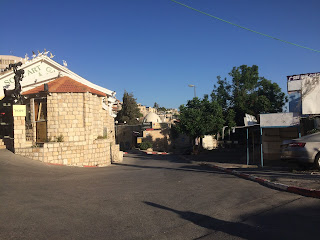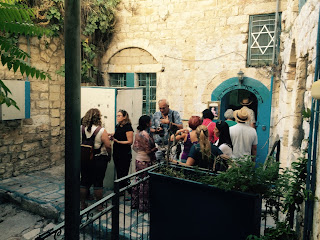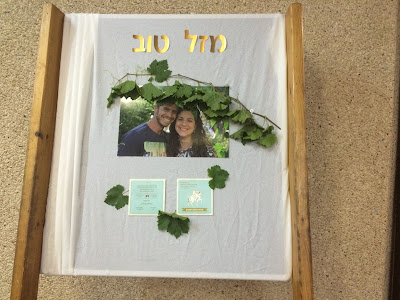Facebook Leads Me to Safed (Tzfat) Through an Angel
 While Facebook is not high on
my list for making or counting friends, its networking power gave me an
unexpected gift allowing me to reconnect with a distant peer, Cory Zacharias, a
vibrant American redhead whom I befriended in Mexico during my teens and lost
touch over the years. Upon my arrival in Israel, Cory messaged me to
congratulate me for making Aliyah, and suggested that I consider attending a Kabbalah
Seminar in Tzfat, given that her university professor, Daniel Matt, a renowned
Kabbalah expert was the scholar in residence. She said that knowing me (the
“Me” she remembered several decades ago), I would love it. Cory was right. I
did not hesitate to inquire, and quickly engaged in the process of registering.
What marvellous parallel, I thought, to visit Tzfat, the ancient city of I had
dreamt of seeing with my own eyes, as well as study with Daniel Matt, a person
I learned is one of the world’s leading authorities on Kabbalah, who has
published over a dozen books, and recently completed an 18-year project of
translating and annotating the Zohar into English, (The Zohar Pritzker
Edition.) As a side note, Jewish leaders today consider his translation a
monumental contribution to the history of Jewish thought.
While Facebook is not high on
my list for making or counting friends, its networking power gave me an
unexpected gift allowing me to reconnect with a distant peer, Cory Zacharias, a
vibrant American redhead whom I befriended in Mexico during my teens and lost
touch over the years. Upon my arrival in Israel, Cory messaged me to
congratulate me for making Aliyah, and suggested that I consider attending a Kabbalah
Seminar in Tzfat, given that her university professor, Daniel Matt, a renowned
Kabbalah expert was the scholar in residence. She said that knowing me (the
“Me” she remembered several decades ago), I would love it. Cory was right. I
did not hesitate to inquire, and quickly engaged in the process of registering.
What marvellous parallel, I thought, to visit Tzfat, the ancient city of I had
dreamt of seeing with my own eyes, as well as study with Daniel Matt, a person
I learned is one of the world’s leading authorities on Kabbalah, who has
published over a dozen books, and recently completed an 18-year project of
translating and annotating the Zohar into English, (The Zohar Pritzker
Edition.) As a side note, Jewish leaders today consider his translation a
monumental contribution to the history of Jewish thought.
The seminar, titled “The Divine
Romance in the Zohar” organized by the International Center of Kabbalah in
Tzfat, took place at the Rimonim Hotel over two days, June 29-30, and left the
30 participants in a state of awe and wonder. During the intense class I
shifted from feeling inquisitive to overwhelmed, understanding to confused and oblivious
to enlightened. I cherish the fact that in the vast material we covered I was
able to mine a few jewels of meaning that I hope to wear on my sleeve to
elevate myself spiritually and emotionally.
 |
| Violeta and John Brozac |
 | ||
| Eyal Reiss, Director of the International Kabbalah Center in Tzfat |
My accommodation at Laurie
Rappeport’s guesthouse was basic: one and a half room and a tiny washroom, but the
place had lots of character. Laurie, also an American, moved to Tzfat decades
ago and decided to build a home in the high place. She was truly supportive and
welcoming, for which I am grateful.
Given that my accommodation was
reasonable, I decided to spend Shabbat in Tzfat, a decision I did not regret.
Shelley also decided to extend her stay, so I did not hesitate to share my
accommodation with her place the last two nights of our stay.
 |
| Sunset before Shabbat |
powers of Facebook. After I posted a few photographs of Tzfat, I received a message from Rabbi Levy Varnai, whose wife Ricky’s parents live in Tzfat. Her parents, Rabbi Shaul and Chaya Bracha Leiter, originally from the US, have lived in Tzfat over decades, and are icons in the religious community of the Institute Ascent. Not only did Rebbetzin Haya Bracha opened her home for me and another ten visitors, serving us a spread of colourful and delicious food, but her husband Rabbi Shaul gave each guest an opportunity to share, discuss and partake in interesting conversation.
Before dinner Laurie Rappeport,
my landlady, took my roommate and I to a Charlebach-style Friday night service
on the rooftop of a spiral building, like a tower. The service was attended by at least 100
people and the singing was inspirational as the combined voices and tunes of
Shabbat dissipated into the horizon. Chanting
and dancing was gender segregated, and I was amazed to see many young and
beautiful girls engaging in the mitzvah of welcoming the Shabbat with such joy
and devotion. While the segregation was
not of my liking, it was nonetheless a unique experience.
On Saturday morning I walked up the hill to get to a Shabbat morning service recommended to my by Haya Bracha, in the Abuchav Synagogue. I wish I could take photographs of this beautiful synagogue that gleaned a taste of Medieval Spain, but was unable to do so as it was Shabbat. As I entered the sanctuary, I had little time to admire it, as I was quickly directed to the floor above where dozens of observant women sat quietly following their prayerbooks. I tried my best to follow the service, but was deprived of the view at the Bima, despite my effort to peak through the balcony wall and the arched pillar before me. I did however hear the Spanish-sounding Hebrew accent and enjoyed the familiarity with most of the prayers that brought me back into my childhood memories attending the Temple Rabbi Yehuda Halevi in Mexico, where I shared many meaningful memories of Jewish rituals in the presence of my maternal family.
On Saturday morning I walked up the hill to get to a Shabbat morning service recommended to my by Haya Bracha, in the Abuchav Synagogue. I wish I could take photographs of this beautiful synagogue that gleaned a taste of Medieval Spain, but was unable to do so as it was Shabbat. As I entered the sanctuary, I had little time to admire it, as I was quickly directed to the floor above where dozens of observant women sat quietly following their prayerbooks. I tried my best to follow the service, but was deprived of the view at the Bima, despite my effort to peak through the balcony wall and the arched pillar before me. I did however hear the Spanish-sounding Hebrew accent and enjoyed the familiarity with most of the prayers that brought me back into my childhood memories attending the Temple Rabbi Yehuda Halevi in Mexico, where I shared many meaningful memories of Jewish rituals in the presence of my maternal family.
Night Tour to Amuca Cemetery to Visit the Tomb of Rabbi Yonathan ben Uziel
Did you know that Rabbi Uziel’s
gravesite at Amuca is a compelling pilgrimage site for singles today who pray
that, through his intervention in the heavens, they will meet their soulmate?
According to Jewish texts, Rabbi
Yonatan Ben Uziel was the most brilliant disciple of the famous Rabbi Shimon
Bar Yohai, who in turn as the most brilliant disciple of Rabbi Akiva. I note that Rabbi Shimon Bar Yohai has been
attributed with the authorship of the Zohar, the chief work of Kabbalah.
 |
| Tomb of Rabbi Yonathan ben Uziel z'l |
The field grip to Amuca complemented
the Kabbalah curriculum and allowed me to experience the mystical realm in Tzfat first
hand. My prayers at this holy site were
not for me, but for my daughters. May they find their soulmate, Amen.
The Holy City of Tzfat
I have left my description of
Tzfat for last, given my difficulty trying to describe her. It is no wonder
that her name is written in so many different ways, which in itself baffles any
visitor to its hills and tunnels:
Safed, Sefad, Safad, Safat,
Safas, Tsfat, Tsefat, Tzfat, Tzefat, Tzfas, Tzefas, Zefat, Zfat, Zfas, Zefad,
etc...
Here is a little history:
The Spanish Inquisition
resulted in the expulsion of over 100,000 Jews from Spain. These Jews were
dispersed throughout the world. Among the fleeing Jews were some of the
greatest rabbinical
and Kabbalistic scholars of the Middle Ages who decided to move to the Land of
Israel. Kabbalah scholars were drawn to
Tzfat because of its proximity to Mt. Meron, the burial place of Rabbi Shimon
Bar Yochai. R' Bar Yochai is believed to have learned the secrets of Kabbalah
while hiding near Tzfat (in Peki'in) from the Romans. It is said that God
appeared to R' Bar Yochai through divine inspiration, imparting the secrets of
the Kabbalah. When the Roman decree against him was lifted, R' Bar Yochai left
his hiding place and began to travel through the area, teaching what he had
received (To Receive is the Hebrew word "L'Kabel", which is the root
of the word "Kabbalah".) Rabbi Shimon Bar Yochai is also believed by
religious Jews to have been the author of the Book of Zohar, the basis of
Kabbalah.
It was during the 15th and 16th centuries that Tzfat became recognized as one of the four holy cities of Israel, the "City of Kabbalah". (The others being Jerusalem as the home of the Temple, Tiberias as the city where the Mishna was compiled, and Hebron as the home of the Cave of Machpelah, resting place of the matriarchs and patriarchs).
It was during the 15th and 16th centuries that Tzfat became recognized as one of the four holy cities of Israel, the "City of Kabbalah". (The others being Jerusalem as the home of the Temple, Tiberias as the city where the Mishna was compiled, and Hebron as the home of the Cave of Machpelah, resting place of the matriarchs and patriarchs).
 In my eyes, the city of Tzfat is
basically a winding maze of tapered alleys, connected through assymetric stairwells
that lead to narrow passages, unexpected bends and unforeseen courtyards. The
stone paved streets in gold tones stretch into the city’s walls, like a mantle
of light. From the windows hang flowery and aromatic arrangements, and the blue
doors display historic plaques. The architectural design, arched gates, and
ironwork windows and doors, speak loudly of the Medieval Spain brought into Tzfat by the Sepharadic sages that brought with them their unique Jewish culture, flavour and beauty.
In my eyes, the city of Tzfat is
basically a winding maze of tapered alleys, connected through assymetric stairwells
that lead to narrow passages, unexpected bends and unforeseen courtyards. The
stone paved streets in gold tones stretch into the city’s walls, like a mantle
of light. From the windows hang flowery and aromatic arrangements, and the blue
doors display historic plaques. The architectural design, arched gates, and
ironwork windows and doors, speak loudly of the Medieval Spain brought into Tzfat by the Sepharadic sages that brought with them their unique Jewish culture, flavour and beauty.
Personally, I love the city in
all its beauty and complexity. Light irradiates and shade filters through the
nooks and wall cracks like a beam of hope. It seemed to me that the duality of which the
Zohar speaks so loudly can be seen, felt and heard in Tzfat. Her Artist's Quarter is nothing but a center of culture, history, art, religion, and
beauty. As in the laws of the universe,
duality equals balance – the old and the new, the sacred and the mundane, the
physical and the spiritual. It all comes together in an enticing and sensual
experience, much like a romance with the Zohar.
 |
| Gemmatria - the science of decoding Hebrew letters and their meaning |
 |
| Viewpoint from Tzfat, the High Place, Crib of Kabbalah Wisdom and Secrets |
Purification Experience
The Jewish ritual of
purification for women is well and alive in the Jewish world, especially in the
more observant communities, and it is certainly present in the holy city of Tzfat. While observant practice focuses on immersion for married
women after their menstrual cycle, in the past several decades conservative and
reform communities have given the immersion waters new spiritual meaning with the purpose to celebrate, uplift, heal and cleanse/renew the souls of women. Reasons range from celebrating a
milestone, a name or career change, recovering from a divorce, healing
emotionally or physically, or simply immersing for the sake of renewal and purification from anything that no longer serves or benefits a person.
Before leaving Vancouver I
tried to immerse in the community Mikveh to mark two important moving forward
life changes; the first, reclaiming my maternal family name Esquinazi; the
second, making Aliyah to Israel. Because I was unable to fit this into my
schedule, I seized the opportunity to make this happen during in stay in Tzfat, especially when I discovered that Nathalie Reiss, the wife of the Kabbalah Center
Director, Eyal Reiss, who is from Venezuela, assists women through this ritual. In short, the very last day of my stay in Tzfat Nathalie picked me up and together with her husband Eyal they drove me to a nearby hill in nature where I
immersed seven times in a rectangular pool of rainwater that is used for immersion by the non-orthodox community, precisely aimed to cleanse, purify
and renew, in this case me! Before the
immersion Nathalie offered me a very personal and meaningful reflection on the value, strength,
depth and purpose of women, and the challenges we face day to day. She emphasized our urgency to let go of the
fears and insecurities that keep us bound, reclaim our G-d given power, and
with self-acceptance and love shed our light unto others. I believe that Nathalie and I speak the same verbal and emotional language and our natural bond felt as fluid as water itself. The few minutes we spent together were truly special to me, she and I, speaking from the heart, two friends, two mothers,
two Jewish women, two hearts and two minds, and one language bonding us together at the same time and place.
 |
| Nathalie Reiss |
 |
| Rainfall basin for immersion aimed at purification and renewal |
Return to Jerusalem
My return to Jerusalem was most
enjoyable, sweetened by the company of three individuals: John, my Vancouver friend, also the driver of
a rental car, Shelley, my roommate, and Danny Mate, the teacher, translator and
friend. During the drive the
conversation was engaging, and the views of the the Judea mountains wrapping the
Sea of Galilee gave pleasure to all of my senses.
I arrived to my home in Yehud
at 10:30pm after boarding several buses dragging my luggage. I was very happy
to come home and felt boundless gratitude for a time well spent.























































































